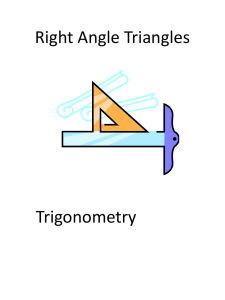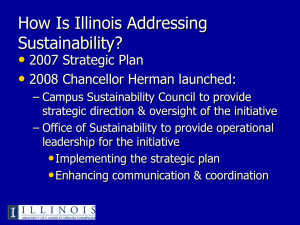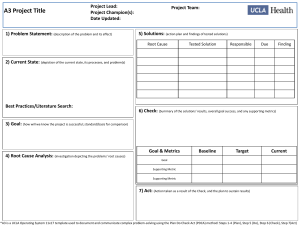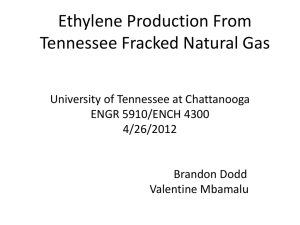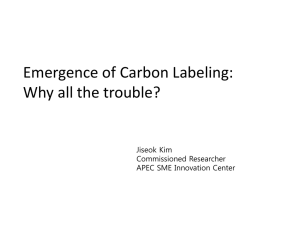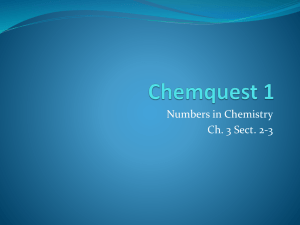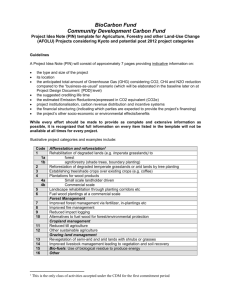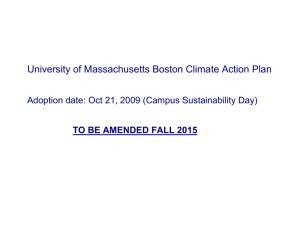ME599 LCA Homework 2..
advertisement
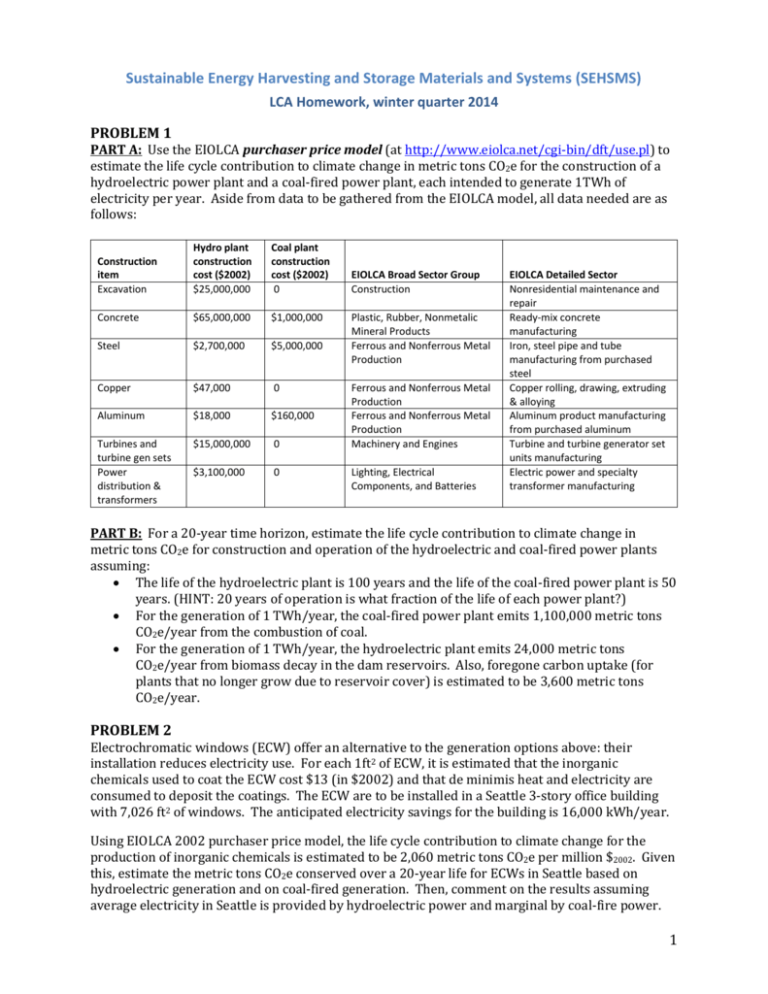
Sustainable Energy Harvesting and Storage Materials and Systems (SEHSMS) LCA Homework, winter quarter 2014 PROBLEM 1 PART A: Use the EIOLCA purchaser price model (at http://www.eiolca.net/cgi-bin/dft/use.pl) to estimate the life cycle contribution to climate change in metric tons CO2e for the construction of a hydroelectric power plant and a coal-fired power plant, each intended to generate 1TWh of electricity per year. Aside from data to be gathered from the EIOLCA model, all data needed are as follows: Construction item Excavation Hydro plant construction cost ($2002) $25,000,000 Coal plant construction cost ($2002) 0 Concrete $65,000,000 $1,000,000 Steel $2,700,000 $5,000,000 Copper $47,000 0 Aluminum $18,000 $160,000 Turbines and turbine gen sets Power distribution & transformers $15,000,000 0 $3,100,000 0 EIOLCA Broad Sector Group Construction Plastic, Rubber, Nonmetalic Mineral Products Ferrous and Nonferrous Metal Production Ferrous and Nonferrous Metal Production Ferrous and Nonferrous Metal Production Machinery and Engines Lighting, Electrical Components, and Batteries EIOLCA Detailed Sector Nonresidential maintenance and repair Ready-mix concrete manufacturing Iron, steel pipe and tube manufacturing from purchased steel Copper rolling, drawing, extruding & alloying Aluminum product manufacturing from purchased aluminum Turbine and turbine generator set units manufacturing Electric power and specialty transformer manufacturing PART B: For a 20-year time horizon, estimate the life cycle contribution to climate change in metric tons CO2e for construction and operation of the hydroelectric and coal-fired power plants assuming: The life of the hydroelectric plant is 100 years and the life of the coal-fired power plant is 50 years. (HINT: 20 years of operation is what fraction of the life of each power plant?) For the generation of 1 TWh/year, the coal-fired power plant emits 1,100,000 metric tons CO2e/year from the combustion of coal. For the generation of 1 TWh/year, the hydroelectric plant emits 24,000 metric tons CO2e/year from biomass decay in the dam reservoirs. Also, foregone carbon uptake (for plants that no longer grow due to reservoir cover) is estimated to be 3,600 metric tons CO2e/year. PROBLEM 2 Electrochromatic windows (ECW) offer an alternative to the generation options above: their installation reduces electricity use. For each 1ft2 of ECW, it is estimated that the inorganic chemicals used to coat the ECW cost $13 (in $2002) and that de minimis heat and electricity are consumed to deposit the coatings. The ECW are to be installed in a Seattle 3-story office building with 7,026 ft2 of windows. The anticipated electricity savings for the building is 16,000 kWh/year. Using EIOLCA 2002 purchaser price model, the life cycle contribution to climate change for the production of inorganic chemicals is estimated to be 2,060 metric tons CO2e per million $2002. Given this, estimate the metric tons CO2e conserved over a 20-year life for ECWs in Seattle based on hydroelectric generation and on coal-fired generation. Then, comment on the results assuming average electricity in Seattle is provided by hydroelectric power and marginal by coal-fire power. 1 PROBLEM 3 If it is assumed that chemicals that have any NFPA rating greater than 2 and/or have a “Special Hazard Rating” should be considered for substitution or precautious handling, which of the following chemicals used in the fabrication of the ECWs should be considered for substitution or precautious handling. Note that the NFPA ratings can be found on the MSDS sheets available at http://www.sigmaaldrich.com/united-states.html by searching the Aldrich chemID number in the table. ECW chemicals ProDoT-Me2 (Poly (3,3-dimethyl-3,4-dihydro2H-thieno[3,4-b][1,4]dioxepine) Acetonitrile TBAP (tetra-n-butylammonium perchlorate) Vanadium(V) oxide 30% Hydrogen peroxide Glacial acetic acid Ti(IV) isopropoxide Poly(ethylene glycol)methacrylate(PEGMA) Lithium perchlorate Propylene carbonate Photo-curing agent: 2,2-Dimethoxy-2phenylacetophenone(DMPA) Indium tin oxide CAS 255901-50-9 Formula C9H12O2S Aldrich chemID for MSDS link 660523 75-05-8 1923-70-2 1314-62-1 7722-84-1 64-19-7 546-68-9 868-77-9 7791-03-9 108-32-7 10124-62-6 CH3CN (CH3CH2CH2CH2)4N(ClO4) V2O5 H2O2 CH3CO2H Ti[OCH(CH3)2]4 CH2=C(CH3)COOCH2CH2OH LiClO4 C4H6O3 ((CH3O)Si(CH3)2)2 675415 86885 204854 316989 320099 377996 128635 634565 82227 678163 50926-11-9 In2O3/ SnO2 494682 2

